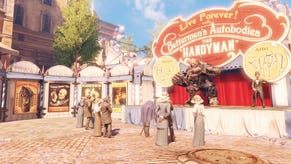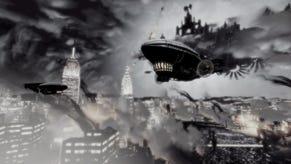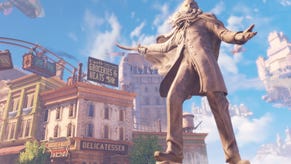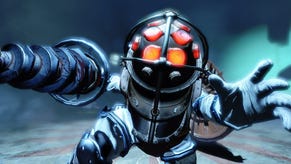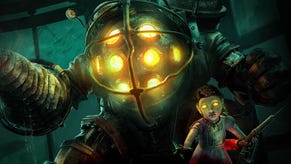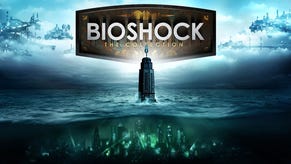BioShock Infinite: Dystopian Americana
BioShock Infinite's world of Columbia is as prominent as any of its lead characters. John Robertson plays the game's opening hours to explore Irrational's weird new world.
Bioshock Infinite's Columbia is a dreamland. A slice of Americana thought only to exist in over-enthusiastic movies, Republican propaganda and the mind of Walt Disney. A floating city of equal parts idealism and impracticality.
Walk along its immaculately groomed streets and you'll encounter cherub-like children selling newspapers, colourful fairs populated by carnival games and candy floss and smitten couples sharing a moment on a perfect white park bench.
Zeppelin airships float gracefully between its various platforms, boardwalks are lit by warm orange lamps and a picturesque sky envelops it all in an otherworldly charm. It even has a beach.
Magnificent, marvellous and majestic are all valid descriptions. An Atlantis of the sky, the kind of place your heart yearns for but your head shuns as unrealistic.
Utopias, however, are rarely utopian.
Columbia is a case in point. Further investigation unearths a place of harsh segregation where anything but pearl white skin is seen as an insult against faith and decency, where any form of anti-establishment thought is ruthlessly crushed and where religion is used as a means of control rather than enlightenment.
Before you even enter the Columbia rabbit-hole there are strong hints that all is not right in paradise. Infinite's opening moments bear some symmetry with those of the first game. Choppy seas, darkness and heavy rains are your greeters once the game fades from black, only this time our protagonist is here by choice - rather than a victim of a plane crash. Booker DeWitt is on the hunt for a certain girl that he must deliver to settle a debt, a situation that forces him to travel to a monolithic lighthouse off the coast of Maine circa-1912.
Far from the end of his search, the arrival at the lighthouse is the start of a journey that - based on the first three hours - promises to be every bit as intriguing and memorable as that jolly through Rapture. The tip of the lighthouse is revealed to be an elaborate rocket-powered pod to the city in the sky. Blasting into the sky might seem like the polar opposite of diving to the ocean floor but Infinite promises no less depth.
Indeed in many ways, this glimpse of BioShock Infinite's opening moments reveals something potentially more intriguing than the doomed sunken city of the first game. For starters DeWitt is a real character, with a voice and his own take on events.
Whereas original hero Jack was a narrative sponge, absorbing all the plot points and character arcs around him, DeWitt is more of a broadcaster intent on giving his own two cents and more directly affecting the actions of others, a trait that amplifies the underlying malevolence of Columbia in that you're provided with a clear outsider's perspective.
“Songbird promises to fulfil a role akin to Resident Evil 3′s Nemesis, an enemy that is impossible to properly rid yourself of and one that will never dampen its pursuit.”
Whether or not that ultimately results in an improved narrative experience remains to be seen, but the opening couple of chapters do a brilliant job of convincing you that the change in tact is one for the better.
DeWitt's character is granted further intrigue thanks to his task of delivering the girl, Elizabeth, to whomever it is that he is indebted. While not fully explained from what we've played, Elizabeth is gifted with supernatural abilities that allow her to tear the fabric of space and create portals to other places.
This power has been the subject of intense scientific research from 'The Prophet' that acts as Columbia's leader, with much of the opening hours dedicated to DeWitt's rescue of Elizabeth from the maximum security facility in which she is housed.
In order to escape, Elizabeth and DeWitt must work together and rely on their respective talents and experiences to get them through safely. This nurtures a bond between the two - a bond which will surely muddle DeWitt's conscience and complicate the decision of whether or not to hand over Elizabeth to his pursuers.
Perhaps the most injured party here is Songbird, a 30-foot tall mechanical bird that was Elizabeth's only friend and her personal bodyguard throughout her incarceration in the research lab. Songbird promises to fulfil a role akin to Resident Evil 3's Nemesis, an enemy that is impossible to properly rid yourself of and one that will never dampen its pursuit.
In a sense it's Infinite's version of a Big Daddy, a supremely powerful creature that bears no grudge to anybody but will fight with all of its might to guarantee the safety of its charge.
Standard combat feels somewhat similar to what we've seen from the series before. Your right hand is used to wield weapons and your left designated to special powers - in this instance known as Vigors.
Vigors available early in the game provide the ability to turn enemy turrets against their own, to harness the power of fire and send grenades and napalm-like traps towards foes and an incredibly useful ability to launch people into the air and have them hover there for a few seconds while you take them out with your gun.
“Despite the combat and increased enemy numbers, though, it’s very clear from the opening couple of missions that Infinite’s main draw is the setting, characters and plot.”
The successful linking of weapon and Vigor is the best way to make it through battles quickly and with limited damage, relying on one or the other is a sure-fire way to get into trouble very quickly. While combat is no less frequent than we've come to expect from Bioshock, enemy numbers are higher.
It's more important, therefore, to keep check on your positioning to prevent yourself being surrounded and flanked by more savvy opposition. Using your Vigors to set up proximity traps - such as the explosive fire traps - seems to be a tactic that will pay dividends, although it's important to point out that I've not had a chance to experiment with all the offensive options on offer.
Despite the combat and increased enemy numbers, though, it's very clear from the opening couple of missions that Infinite's main draw is the setting, characters and plot. All three of those narrative pillars act in unison to immediately pull you into the game and fuel your desire to see how this world and its inhabitants will change as it struggles to settle the disruption DeWitt has wrought upon it.
If it achieves just half the quality that the first game provided then BioShock Infinite will be more than a satisfactory experience in the grand scheme of things, considering the comparative predictability of most first-person titles.
Satisfactory is not what we want from Bioshock, however. If these first few hours are anything to go by, we've got little to worry about. The only complaint I can level at Infinite so far is that I've not been allowed to be play more of it.





